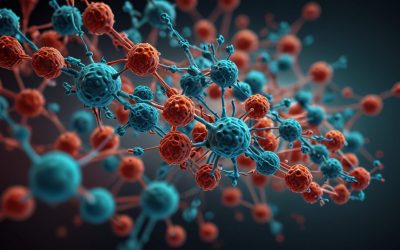While you might think that your environment plays the most substantial role in shaping your immune system, don’t overlook the pivotal influence of your genetic makeup. As you sit there, your body’s defense mechanisms, fine-tuned by the genes passed down from your ancestors, are at work, silently determining how effectively you can fend off infections, including those from helminths. It’s true that genetics isn’t the sole player—environmental factors also contribute significantly—but it’s the interplay between your genetic blueprint and these external elements that truly crafts your immune response. You may wonder just how deeply your DNA affects your ability to resist or succumb to pathogens. Imagine if understanding this complex relationship could unlock personalized therapeutic strategies tailored just for you. Let’s consider the possibility that within your genome lies a map to optimizing your immune health, a map that scientists are only beginning to unravel.
Key Takeaways
- Genetic makeup plays a significant role in influencing immune response to helminths.
- Environmental factors, such as diet and pollutants, can modulate the immune response to helminths.
- The interaction between genetic and environmental factors determines the intensity of helminth infection.
- Personalized medical strategies based on genetic variations can enhance immune responses and improve therapeutic outcomes.
Understanding Immune Variability
To comprehend why your body reacts differently to helminth infections than someone else’s might, it’s essential to analyze the intricate interplay between genetic predispositions and environmental exposures. The variability in immune responses to these parasites is not random; it is significantly influenced by host genetic factors, specifically genetic variation within populations. For instance, certain HLA alleles—components of the major histocompatibility complex (MHC) critical for immune function—can dictate the strength and efficacy of your immune response.
Delving deeper into the adaptive immune system reveals that CD4 T cells, a subset of immune cells, play a pivotal role in orchestrating the body’s defense against helminths. However, the activation and differentiation of these cells can be greatly affected by genetic loci that vary among individuals. A genome-wide association study (GWAS) can identify these loci and provide a comprehensive map of the genetic determinants that contribute to the divergent immune responses observed.
These genetic factors are not acting in isolation. Environmental factors, including prior exposure to pathogens, nutrition, and co-infections, can modulate the immune response. This interaction between your genetic makeup and environmental pressures shapes the trajectory of infection, influencing whether you experience a mild or severe helminth infestation.
Genetic Determinants of Immunity

While host genetics and environmental factors are crucial, it’s the specific genetic determinants that largely dictate your immune system’s response to helminth infections. The genetic makeup of an individual influences the functionality and efficiency of their host immune system. Inbred mouse strains such as C57BL/6 and BALB/c serve as models to dissect the impact of genetic factors on helminth susceptibility. These strains exhibit a range of reactions, from resistance to vulnerability, rooted in their distinct genetic profiles.
Genetic determinants responsible for these variations are often located within regions known as quantitative trait loci (QTLs). These QTLs harbor immune response genes that encode for proteins essential in recognizing and responding to helminth antigens. For example, genes within the major histocompatibility complex (MHC), particularly HLA class II molecules, are pivotal in presenting helminth-derived peptides to immune cell types, thereby orchestrating a tailored immune response.
Your body’s ability to mount an effective defense against helminths is, therefore, a reflection of intricate genetic associations. It’s these associations that govern the expression and activity of proteins involved in immune recognition and signal transduction. The diversity of these genetic determinants, combined with host genetics, result in a highly individualized immune landscape.
Understanding the relationship between genetic factors and susceptibility to helminth infection is essential in developing targeted interventions. By identifying and characterizing the key genetic variations that influence the host immune system, you can contribute to the creation of personalized medical strategies. Such strategies could enhance immune responses in individuals with genetic predispositions to helminth infections, ultimately serving the health needs of diverse populations.
Heritability of Immune Traits
Understanding the heritability of immune traits is essential, as both your genetic makeup and environmental exposures shape your immune system’s ability to combat helminth infections. Heritability refers to the proportion of observed variation in a particular trait that can be attributed to inherited genetic factors in contrast to environmental ones. In the context of helminth infections, your susceptibility or resistance may be significantly influenced by the underlying genetics of your immune system.
The immune system comprises both innate and adaptive immune components, each with its own set of immune cells and mechanisms. Here’s an analytical breakdown of how genetic factors influence various aspects of your immune traits:
- Genetic Factors:
- *Genes*: Specific genes and genetic regions have been conserved across species, indicating their critical role in immune response. Notably, genes within the Human Leukocyte Antigen (HLA) complex are vital for the function of T lymphocytes in recognizing foreign antigens.
- *Immune Cell Variability*: T lymphocytes, a central part of the adaptive immune response, exhibit a range of functionalities based on genetic variation.
- *Innate and Adaptive Immune Coordination*: Genetic factors determine the interplay between innate and adaptive immune systems, which is essential for a comprehensive response to helminth infections.
Research using inbred mouse strains has demonstrated significant heritability of immune traits. For example, strains like BALB/c, AKR, and B10.BR show varied immune responses to the same helminth infection, which is directly tied to their genetic makeup. These findings imply that the effectiveness of your immune response to helminth infections is not solely a result of your environment but is deeply rooted in your genetic code. Understanding this complex interplay between heritability and immune traits is paramount for those serving in healthcare and research, aiming to tailor interventions that align with individual genetic predispositions.
Environmental Impacts on Immunity

Although your genetic makeup plays a crucial role in shaping immune defenses against helminth infections, environmental factors also significantly impact your immune system’s efficacy. Environmental influences such as diet, pollutants, and microbial exposures can alter the host response to these parasites. You must understand that the immune response is not solely determined by genetic factors but is also modulated by environmental contexts.
The myriad of cell types involved in the human immune system, including both innate and adaptive cells, can be affected by environmental factors. These can act as regulatory elements, enhancing or suppressing the immune response. For instance, inflammatory conditions can be exacerbated by pollutants, which may also affect the integrity of mucosal surfaces—a critical barrier against helminth infection.
You may find that in diverse communities, where lifestyle differences are pronounced, the intensity of helminth infection varies considerably from one individual to another. This variability is attributable to the interplay between genetic predispositions and environmental impacts. By recognizing the importance of environmental factors, you can advocate for healthier living conditions that may reduce the burden of helminth infections.
Environmental factors can influence the expression of genes involved in immune responses, thereby affecting the efficacy of these responses. A deeper understanding of these dynamics is vital for developing new prophylactic and therapeutic strategies that are tailored to the needs of specific populations. As someone dedicated to serving others, it is essential to consider these environmental elements when addressing helminth infections, aiming for interventions that are both effective and context-sensitive.
Gene-Environment Interactions
Gene-environment interactions are pivotal in shaping your immune system’s response to helminth infections, with genetics and external factors intricately influencing susceptibility and resistance. The field of genetic epidemiology has shed light on how these interactions modulate the immune response, providing insights into the complex mechanisms at play.
- Genetic Factors:
- Inbred mouse strains exemplify the role of genetic factors in determining relative susceptibility and resistance to helminth infections.
- Variations in HLA class II genes among different populations can significantly influence host expression of immune responses.
- Genetic variations contribute to the diversity in immune responses observed across individuals and populations.
- Environmental Factors:
- Exposure to varying environmental conditions, such as sanitation levels or endemic pathogen presence, impacts immune system priming and response.
- Lifestyle factors, including diet and co-infections, can modulate the immune response through gene-environment interactions.
- The environment acts as a selective pressure that can shape the genetic makeup of populations over time.
- Gene-Environment Interactions:
- Studies demonstrate that the intensity of helminth infection is not solely determined by genetic or environmental factors, but by their interaction.
- Understanding these interactions is crucial for developing targeted prophylactic and therapeutic strategies.
- The dynamic interplay between genetic and environmental factors requires precise and tailored approaches in public health interventions.
In your role focused on serving others, appreciating the technical intricacies of gene-environment interactions is fundamental. It allows for the design of interventions that consider both genetic predispositions and environmental exposures, thereby enhancing the efficacy of health strategies against helminth infections.
Personalized Medicine and Genetics

In the realm of personalized medicine, your unique genetic blueprint steers the customization of medical treatments, ensuring they align precisely with your individual health requirements. This approach leverages insights from pharmacogenomics, focusing on how your genetic factors influence drug efficacy and safety. By analyzing your DNA, clinicians can predict your susceptibility to certain conditions and your likely response to various pharmaceuticals.
Central to this genetic landscape are your human leukocyte antigen (HLA) genes, particularly the HLA class II region, which plays a critical role in your immune system’s ability to recognize and respond to pathogens. Variations in these immune response genes contribute to the genetic variation in immune response observed across individuals. For instance, certain HLA alleles may render you genetically resistant to specific infections, or conversely, predispose you to autoimmune diseases like type 1 diabetes.
The field of personalized medicine is particularly attentive to these variations. For example, twin studies have illuminated the influence of heritability on immune response, underscoring the importance of genetic factors alongside environmental influences. By integrating genetic data, healthcare providers can craft personalized treatment regimens that minimize adverse reactions and improve therapeutic outcomes.
In your journey to assist others through personalized medicine, consider the potential for HLA typing to guide clinical decision-making. This precision in tailoring interventions can lead to a significant reduction in the trial-and-error approach commonly associated with prescribing medication, ultimately fostering a more efficient and patient-centric healthcare system. Your commitment to integrating genetic knowledge in clinical practice is paramount in realizing the full potential of personalized medicine.
Future Directions in Immunogenetics
Exploring the future of immunogenetics, researchers aim to unravel how genetic diversity shapes individual immune responses to helminth infections, paving the way for targeted prophylactic and therapeutic strategies. You must understand that your body’s defense mechanisms are influenced by a complex interplay of genetic and environmental factors. Immunogenetics future research focuses on these areas:
- Genetic Variation in Immune Response
- Identifying novel genetic factors that contribute to the variability in immune responses among individuals.
- Studying the role of HLA class II molecules and other immune response genes in susceptibility or resistance to infections.
- Analyzing the impact of genetic variation on the production and efficacy of Immunoglobulin G (IgG) in fighting helminth infections.
- Role of Immune Cells
- Investigating how regulatory T cells modulate immune responses and their genetic determinants.
- Exploring the genetic basis for the differentiation and function of various immune cells during helminth infections.
- Interplay with Environmental Factors
- Examining how environmental factors and immune response interact with genetic predispositions to affect disease outcomes.
- Assessing the influence of lifestyle, diet, and co-infections on the expression of immune response genes.
Your role in this research is crucial; by understanding genetic susceptibility and resistance, you can contribute to the development of personalized medical interventions. The interaction between an individual’s genome and their environment dictates the effectiveness of their immune response; recognizing this can lead to breakthroughs in preventing and treating diseases. Keep in mind that the overarching goal is to serve individuals by tailoring interventions to their unique genetic makeup, optimizing health outcomes in a way that is both effective and compassionate.











